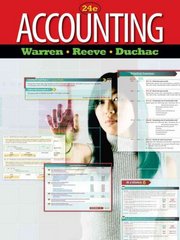Question
You are part of the audit team assigned to Oak Floor Limited (Oak). Oak is a distributor of imported floor and wall tiles and supplies
You are part of the audit team assigned to Oak Floor Limited ("Oak"). Oak is a distributor of imported floor and wall tiles and supplies tiling contactors and retail stores. You are assigned the task of reviewing and evaluating the internal controls over the billings and remittances transaction cycles. You have been provided with the following narrative relating to the internal control system over this area. Sales recording, maintenance of accounts receivable and collection procedures are shared between the accounts receivable clerk, a cashier /secretary and the telephone secretary. Their procedures in regard to billing and collection have been described as follows.
After opening the mail, the telephone secretary hands customers' purchase orders to the accounts receivable clerk ('AR"). To prevent delays in dispatch of orders, AR prepares a five part sales invoice for distribution as follows:
Copy 1: customers' copy (held by AR until notice of dispatch is received).
Copy 2: Accounts Receivable Department copy
Copies 3 & 5: Dispatch Department copies
Copy 4: Warehouse Managers' copy
In the warehouse, the inventory is drawn as shown on copy 4 of the invoice with quantities adjusted as necessary. The warehouse copy invoice is filed in date order as recorded on the invoice.
The Dispatch department receives the order from the warehouse identified by the customer's name, and quantities and product descriptions are checked to invoice copies. Where ordered quantities are more than the available stock, Dispatch Department staff alter both of their copies to agree with the quantity being supplied. Then the goods are prepared for shipment and a two-copy delivery docket prepared. Copy 3 of the invoice is placed in one carton as a packing slip.
Copy 5 of the invoice is returned to the Accounts Receivable Department together with the original of the delivery docket. A document number is assigned, the copy of which is filed numerically by the Dispatch Department staff.
When copy 5 is received by the Accounts Receivable clerk, he records the invoice number, actual quantities dispatched, prices, extensions, discounts, if any, and total on copies 1 and 2. Copy 1 is forwarded to the customer together with the original of the delivery docket.
The accounts receivable ledger and the sales journal are prepared simultaneously. To minimize errors, sales are posted to the accounts receivable ledger and sales journal using copy 2 of the invoice which is subsequently attached to copy 5 and filed numerically. Each month, the general ledger clerk summarizes the sales journal for posting to the general ledger.
Because Oak has a liquidity problem, the deposit of receipts is also expedited. The receptionist hands all mail receipts and related correspondence to AR who examines the cheques and determines whether or not the accompanying vouchers or correspondence contain enough detail to permit posting of the accounts. The AR then endorses the cheques and gives them to the cashier who prepares the daily deposits. No cash is received in the mail and no goods are sold over the counter.
The AR uses the vouchers or correspondence that accompanied the cheques to post the accounts receivable ledger cards. A cash receipt register is prepared as a carbon copy of postings. Monthly, the general ledger clerk summarizes the cash receipts register for posting to the general ledger accounts. The AR also corresponds with customers about unauthorized deductions for discounts, allowances, returns, etc, and prepares the appropriate credit notes. Disputes involving large amounts are handed over to the sales manager for settlement. Each month, AR prepares a trail balance of the accounts receivable to agree with the general ledger.
Required:
Use the following table to:
Prepare a management letter to Oak detailing your review and evaluation of its internal control (IC) over customer billings and remittances. You need to identify 5 (FIVE) weaknesses, the potential consequences (effects) of those weaknesses, how these weaknesses could be corrected (strengthened), and at least ONE substantive audit procedure for testing the significance of the potential error.
Step by Step Solution
There are 3 Steps involved in it
Step: 1

Get Instant Access to Expert-Tailored Solutions
See step-by-step solutions with expert insights and AI powered tools for academic success
Step: 2

Step: 3

Ace Your Homework with AI
Get the answers you need in no time with our AI-driven, step-by-step assistance
Get Started


